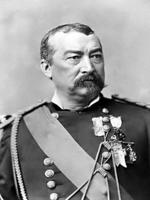 Eric started into this Sheridan revision the way I started into my McClellan rethink (if I read his introduction correctly): reading, one encounters a consensus; it is monolithic and inescapable. At the same time, researching other matters constantly uncovers more material detrimental to the consensus.
Eric started into this Sheridan revision the way I started into my McClellan rethink (if I read his introduction correctly): reading, one encounters a consensus; it is monolithic and inescapable. At the same time, researching other matters constantly uncovers more material detrimental to the consensus.A point is reached where the consensus is untenable, where one feels obliged to stand up and say to the many Pulitzer bearers, either stop your nonsense or deal with the contrary evidence. In other words, sit up straight and act like an historian, dammit.
This is where we join Wittenberg in Little Phil. He is laying out the anecdotes and incidents that make accolades of “great general” or “great cavalry commander” impossible. He is stating the total case against Sheridan because no one has dealt with the unpleasant material as a single body of evidence, no one is seeing a complete picture of limitations and shortcomings. He is demanding that the consensus mongers put up or shut up.
The danger in this approach is that if forcefully delivered it appears to be replacing one form of absolutism with another. I see from some Amazon reviews of the book that some readers have mistaken it for yet another “my way or the highway” ACW offering in a long series of obnoxiously “definitive” doctrines. If this were happening, Wittenberg’s presentation would still have merit because it replaces conclusions flowing from storytelling with conclusions based on analysis. It would be a higher form of "my way." But the complaint (that this revision offers a new absolutism) will not hold because however forcefully delivered, Wittenberg repeatedly challenges readers to contest his presentation. At one point he even says that he looks forward to hearing from dissenters, that he looks forward to engaging in a public debate.
This is a crucial distinction between Little Phil and its predecessors. The attitude, “show me how I am wrong” opens the possibility of correcting the pendulum’s swing, if it has gone too far. Of restoring any evidence not given its full due. Wittenberg is attempting to enter into a dialog with “public history.”
Although this is the best format for presenting a corrective – analysis in the form of legal case – it does have limits. First, the story lover is not used to analysis and inviting him to weigh evidence in your case may not produce quite the verdict you are looking for.
Secondly, there is the important issue of context. On me and my McClellan projects, this need has cast a deep pall of gloom. A revision of the McClellan legend requires, I think, a wholesale replacement of the context in which he is viewed. When friends ask me to merely retell Centennial history with an upgraded role for the McClellan character, I balk.
Eric Wittenberg does have it easier in this respect than I do; I think he can revise the Sheridan legend without bringing down the whole temple of conventional Civil War history. Such a limited revision, however, thrusts upon him specific questions of “how” and “why” here and there. What did Grant see in this man? Why do historical writers love him so?
Wittenberg’s management of these kinds of issues is done courtroom style: he focuses on his points, he does not expand the scope of the trial, he does not seek speculative answers to hypothetical objections. Here is what Sheridan said and here is what he did and here is what the record reports. Let the evidence tell the story.
This calls attention to the evidence and the fair handling of evidence. I trust Eric Witttenberg and believe that he has handled the Sheridan material fairly. The difficulty in Little Phil, however, is that it solicits confidence in a less-well-known author from a star-struck general readership jaded by the corrupt evidence handling of storytellers, conditioned by stereotyped history, and trained to enjoy the spectacle of incompetent researchers sewing shiny fragments into bright lying tapestries.
Eric Wittenberg is attempting to operate rationally in the irrational world of Civil War history. God bless him.
He is measuredly speaking to a wrought-up crowd whose non-historical approach to history reading has been blessed and blessed again by heavily credentialed "official" historians. Thus, while General Sheridan’s reputation presents this freakish figure perceived through a funhouse mirror, the question stands: will the carney's patrons pay money to visit a room full of normal mirrors?
After all, is this not about entertainment?
(Enough historiography, on to the gist of the book tomorrow.)



